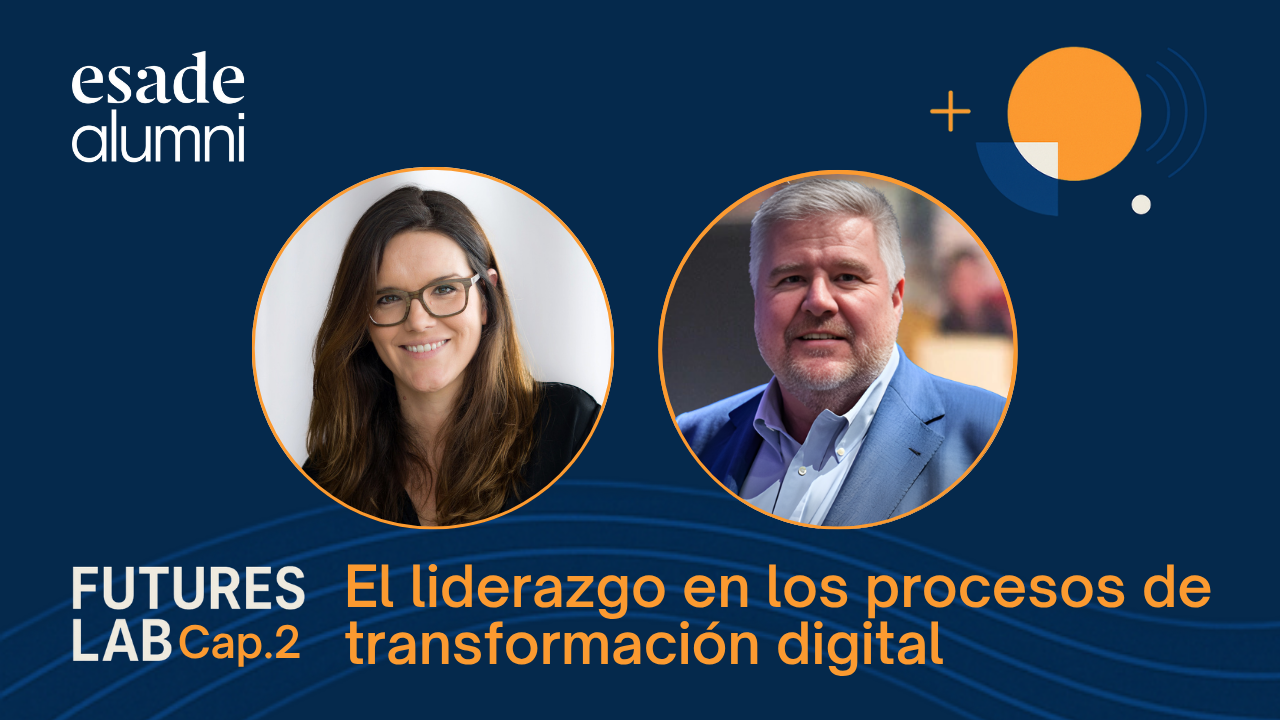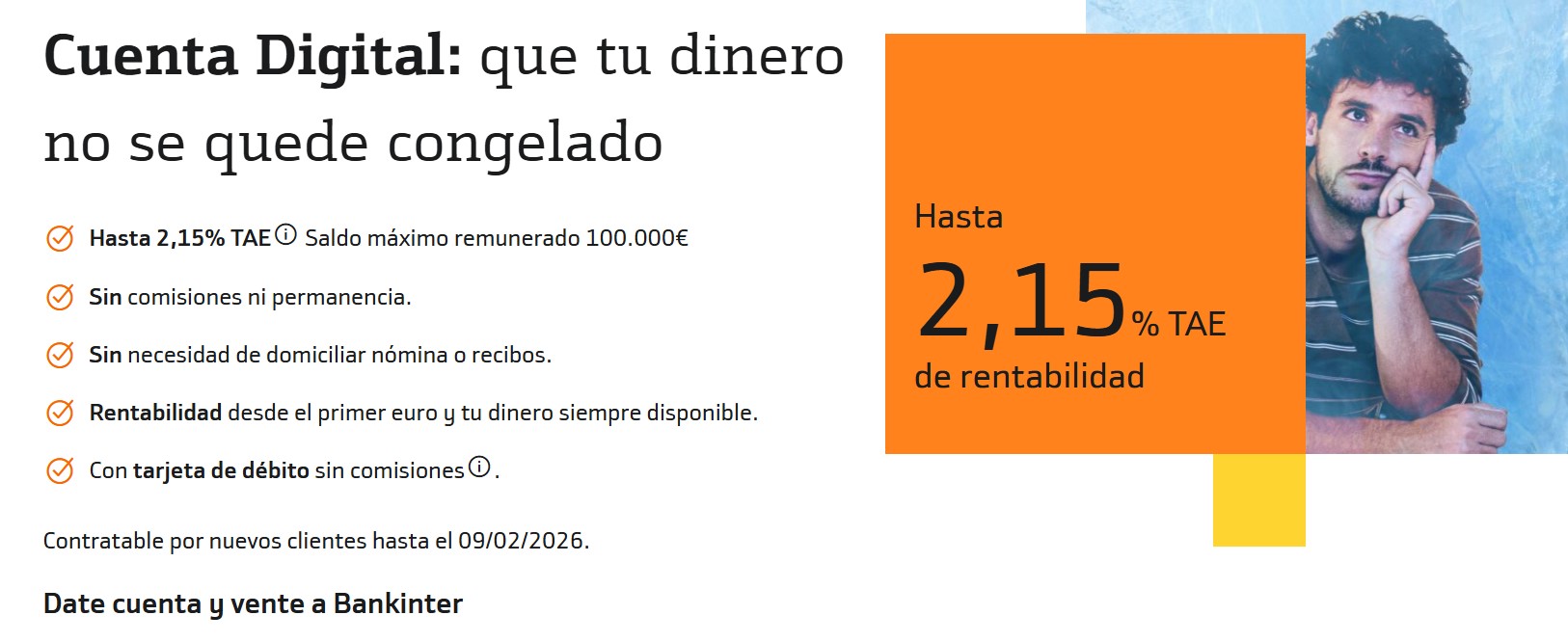Personal effectiveness expert Agustín Peralt (Full-Time MBA ‘96) recently led a session entitled “Work Smarter, Not Harder”
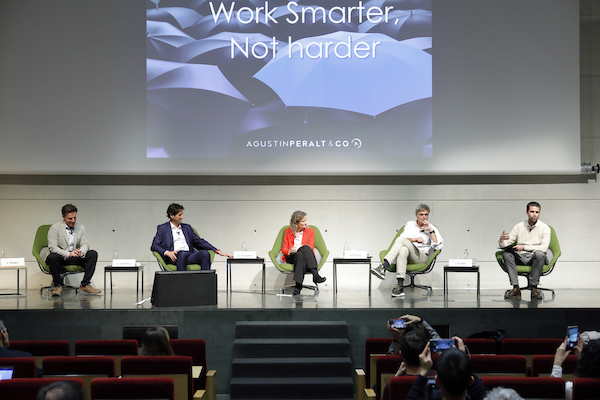
In today’s world, being an entrepreneur, executive or professional entails managing an increasingly complex and demanding environment. Many people try to cope with this complexity by working longer hours, assuming that stress and bad schedules are the price of admission for professional success. However, there are also success stories of people who do highly complex work, yet manage to lead balanced and harmonious lives.
Iñaki Ocaña (Lic&MBA ‘06), Global Relations & Careers Director at Esade Alumni, moderated the session, which focused on the highly topical subject of achieving work-life balance regardless of one’s chosen career. “It doesn’t matter what position you hold; this method applies to everyone,” declared Ocaña, referring to the FASE Method created by the personal effectiveness expert Agustín Peralt (Full-Time MBA ‘96). Peralt has worked on more than 100 efficiency projects for a wide range of groups. Drawing on this experience, he developed a personal organisation method that focuses on four critical areas of effective productivity: focus, attention, systematisation and energy.
“We live in a complex environment, where organisations have powerful transformation agendas,” explained Peralt during his presentation. “Everything is complex and will become even more so. The problem is that we have an overabundance of distractions.”
According to Peralt, the problem revolves around the following factors:
- Lack of energy and personal well-being
- Many distractions and lack of time
- Lack of clarity on priorities
- Unbalanced calendar vs. real priorities
- Lack of systematics to measure progress
Against this backdrop, full attention can lead to exponential performance and time gain. The systematisation of habits and a plan to improve physical, emotional, cognitive and collective energy are necessary in order to improve productivity. In order to do this, we must prioritise, plan our tasks and test our progress.
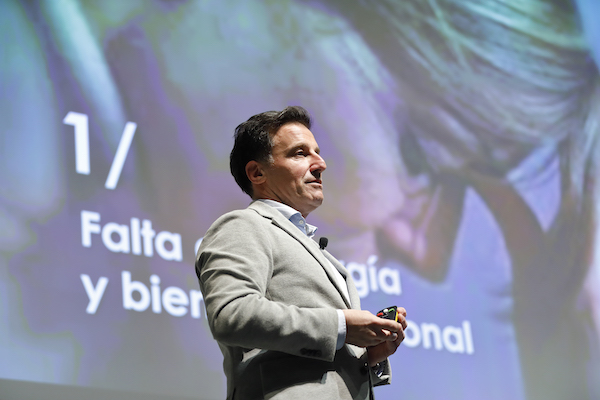
“For our three guests today, there was a moment when they told themselves that they wanted to lead balanced lives,” explained Peralt. “They undertook the necessary changes through self-leadership: they assumed individual responsibility and entered into an ongoing process of self-reflection and identifying areas for improvement.” Executives who achieve definitive balance differ from those who do not by going beyond occasional tips and advice to instead incorporate habits that really transform their work method in a long-lasting way.
According to Peralt, to achieve this balance, you must identify the most important priorities and proactively manage your calendar in order to do quality work. “Some people are smart or put in lots of hours,” he explained. “But you have to analyse whether you are really doing well in life. Apart from work, there are other areas: your home and family, your friends, your hobbies, your personal well-being and your finances.”
Personal experiences
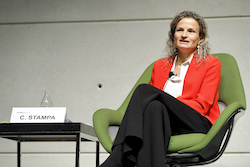 Cristina Stampa (Lic&MBA ‘98), Marketing and Digital Director at GrandVision Spain, discussed her passion for her work, as well as for her three children and for sports: “These are three key areas of my life that became more and more complicated, until finally the balance began to fail. I got into the FASE Method and learned how to master my calendar rather than letting my calendar master me; I learned to differentiate between urgent and important, limit my level of self-demand, and isolate myself in order to concentrate and move forward.” She mentioned the typical professional woman who never manages to get organised or have time for herself: “Having time is a matter of spending time. Everyone must find their own source of energy and find their own balance.”
Cristina Stampa (Lic&MBA ‘98), Marketing and Digital Director at GrandVision Spain, discussed her passion for her work, as well as for her three children and for sports: “These are three key areas of my life that became more and more complicated, until finally the balance began to fail. I got into the FASE Method and learned how to master my calendar rather than letting my calendar master me; I learned to differentiate between urgent and important, limit my level of self-demand, and isolate myself in order to concentrate and move forward.” She mentioned the typical professional woman who never manages to get organised or have time for herself: “Having time is a matter of spending time. Everyone must find their own source of energy and find their own balance.”
 Ángel Quemada (MFL ‘13), Dean of the Barcelona Solicitors’ Association and Managing Partner at the law firm Quemada Procuradores, stressed the importance of learning to get organised and stay ahead of the game in order to master the art of personal organisation before it’s too late. Three months before being appointed to his current role, he began his journey of transforming how he stays organised and how he works. “Self-knowledge is fundamental,” he explained. “Whenever I feel bad, I notice it in physical sensations. That’s when I know it’s time to stop and take a breath. Not recognising your emotions and not showing your weaknesses is a mistake, because it will end up taking its toll on you. It’s okay to show weakness. You can learn from it.”
Ángel Quemada (MFL ‘13), Dean of the Barcelona Solicitors’ Association and Managing Partner at the law firm Quemada Procuradores, stressed the importance of learning to get organised and stay ahead of the game in order to master the art of personal organisation before it’s too late. Three months before being appointed to his current role, he began his journey of transforming how he stays organised and how he works. “Self-knowledge is fundamental,” he explained. “Whenever I feel bad, I notice it in physical sensations. That’s when I know it’s time to stop and take a breath. Not recognising your emotions and not showing your weaknesses is a mistake, because it will end up taking its toll on you. It’s okay to show weakness. You can learn from it.”
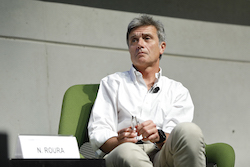 Narcís Roura (Lic&MBA ‘88), General Manager for Southwest Europe at PepsiCo, noted that when you get to positions like his – chief executive for several countries – it’s easy fall into the trap of thinking that working long days and 60+ hour weeks can increase your likelihood of success. “I thought I had to withstand pressure better than anyone else in order to get ahead in my career,” he explained. “I thought the saying ‘no pain no gain’ was true. This was the wrong mindset. What it’s all about is doing your best in the really key areas where you add value. Anything else leads to a silent and progressive deterioration, while also setting a bad example for the organisation. With the FASE Method, you start to see things differently. Your environment starts to look different. And things turn out differently.”
Narcís Roura (Lic&MBA ‘88), General Manager for Southwest Europe at PepsiCo, noted that when you get to positions like his – chief executive for several countries – it’s easy fall into the trap of thinking that working long days and 60+ hour weeks can increase your likelihood of success. “I thought I had to withstand pressure better than anyone else in order to get ahead in my career,” he explained. “I thought the saying ‘no pain no gain’ was true. This was the wrong mindset. What it’s all about is doing your best in the really key areas where you add value. Anything else leads to a silent and progressive deterioration, while also setting a bad example for the organisation. With the FASE Method, you start to see things differently. Your environment starts to look different. And things turn out differently.”
Visit our Content Hub to watch a video of the session.
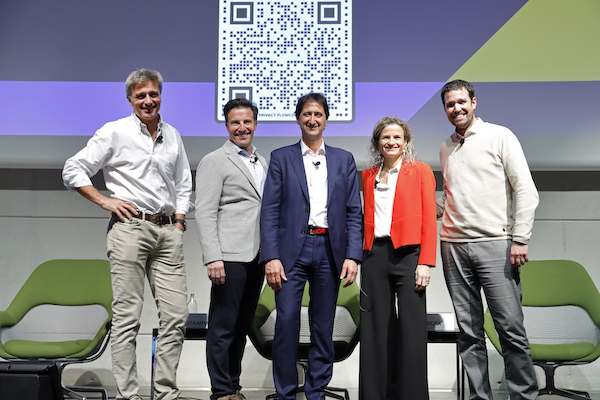



 Cristina Stampa (Lic&MBA ‘98), Marketing and Digital Director at GrandVision Spain, discussed her passion for her work, as well as for her three children and for sports: “These are three key areas of my life that became more and more complicated, until finally the balance began to fail. I got into the FASE Method and learned how to master my calendar rather than letting my calendar master me; I learned to differentiate between urgent and important, limit my level of self-demand, and isolate myself in order to concentrate and move forward.” She mentioned the typical professional woman who never manages to get organised or have time for herself: “Having time is a matter of spending time. Everyone must find their own source of energy and find their own balance.”
Cristina Stampa (Lic&MBA ‘98), Marketing and Digital Director at GrandVision Spain, discussed her passion for her work, as well as for her three children and for sports: “These are three key areas of my life that became more and more complicated, until finally the balance began to fail. I got into the FASE Method and learned how to master my calendar rather than letting my calendar master me; I learned to differentiate between urgent and important, limit my level of self-demand, and isolate myself in order to concentrate and move forward.” She mentioned the typical professional woman who never manages to get organised or have time for herself: “Having time is a matter of spending time. Everyone must find their own source of energy and find their own balance.” Ángel Quemada (MFL ‘13), Dean of the Barcelona Solicitors’ Association and Managing Partner at the law firm Quemada Procuradores, stressed the importance of learning to get organised and stay ahead of the game in order to master the art of personal organisation before it’s too late. Three months before being appointed to his current role, he began his journey of transforming how he stays organised and how he works. “Self-knowledge is fundamental,” he explained. “Whenever I feel bad, I notice it in physical sensations. That’s when I know it’s time to stop and take a breath. Not recognising your emotions and not showing your weaknesses is a mistake, because it will end up taking its toll on you. It’s okay to show weakness. You can learn from it.”
Ángel Quemada (MFL ‘13), Dean of the Barcelona Solicitors’ Association and Managing Partner at the law firm Quemada Procuradores, stressed the importance of learning to get organised and stay ahead of the game in order to master the art of personal organisation before it’s too late. Three months before being appointed to his current role, he began his journey of transforming how he stays organised and how he works. “Self-knowledge is fundamental,” he explained. “Whenever I feel bad, I notice it in physical sensations. That’s when I know it’s time to stop and take a breath. Not recognising your emotions and not showing your weaknesses is a mistake, because it will end up taking its toll on you. It’s okay to show weakness. You can learn from it.” Narcís Roura (Lic&MBA ‘88), General Manager for Southwest Europe at PepsiCo, noted that when you get to positions like his – chief executive for several countries – it’s easy fall into the trap of thinking that working long days and 60+ hour weeks can increase your likelihood of success. “I thought I had to withstand pressure better than anyone else in order to get ahead in my career,” he explained. “I thought the saying ‘no pain no gain’ was true. This was the wrong mindset. What it’s all about is doing your best in the really key areas where you add value. Anything else leads to a silent and progressive deterioration, while also setting a bad example for the organisation. With the FASE Method, you start to see things differently. Your environment starts to look different. And things turn out differently.”
Narcís Roura (Lic&MBA ‘88), General Manager for Southwest Europe at PepsiCo, noted that when you get to positions like his – chief executive for several countries – it’s easy fall into the trap of thinking that working long days and 60+ hour weeks can increase your likelihood of success. “I thought I had to withstand pressure better than anyone else in order to get ahead in my career,” he explained. “I thought the saying ‘no pain no gain’ was true. This was the wrong mindset. What it’s all about is doing your best in the really key areas where you add value. Anything else leads to a silent and progressive deterioration, while also setting a bad example for the organisation. With the FASE Method, you start to see things differently. Your environment starts to look different. And things turn out differently.”


